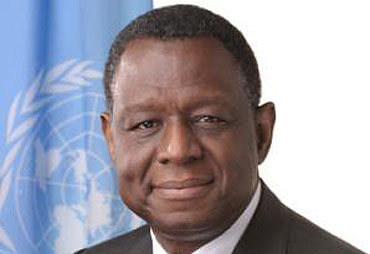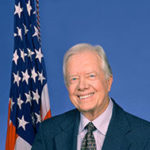Keynote by President Jimmy Carter at 2008 Skoll Awards for Social Entrepreneurship
Video Description
Former U.S. President Jimmy Carter shares thoughts on social entrepreneurship at the 2008 Skoll World Forum awards ceremony. He also talks about the people who most affected his life and the Carter Center’s work eradicating Guinea Worm.
Speakers
-

Executive Director, United Nations Population Fund
On 1 January 2011, Dr. Babatunde Osotimehin became the fourth Executive Director of UNFPA, the United Nations Population Fund. Before this appointment, Dr. Osotimehin was Nigeria’s Minister of Health. Prior to that, he was Director-General of Nigeria’s National Agency for the Control of AIDS, which coordinates HIV and AIDS work in a country of more than 150 million people. Dr. Osotimehin qualified as a doctor from the University of Ibadan, Nigeria, in 1972, and went to the University of Birmingham, England, and got a doctorate in medicine in 1979. He was appointed Professor at the University of Ibadan in 1980 and headed the Department of Clinical Pathology before being elected Provost of the College of Medicine in 1990. Years later, he served in several organizations, including as Chair of the National Action Committee on AIDS, from 2002 to 2007. The Executive Director has participated in the Cairo Population Conference, Beijing Women’s Conference and United Nations special sessions on AIDS. Dr. Osotimehin received the Nigerian national honour of Officer of the Order of the Niger (OON) in December 2005. His interests include youth and gender, within the context of reproductive health and rights. He is married and has five children.
-
MBA student,
Gillian Langor is an MBA student at the Saïd Business School and an Associate Fellow at the Skoll Centre for Social Entrepreneurship. She is a mechanical engineer with a background in product design and is interested in using design methodologies to create social impact.
-

,
Jimmy Carter was born in rural Georgia in 1924 to a farmer/businessman and a registered nurse. Most of Carter’s childhood neighbors were poor African-Americans, and though his father supported segregation, many of Carter’s friends were the children of black farmhands. Early on, he learned of marginalization and unjust distribution of resources.
He attended public schools and graduated from the U.S. Naval Academy, rose to the rank of lieutenant, and served as senior officer of the pre-commissioning crew of the second nuclear submarine. After his father’s death, Carter returned to Georgia to run the family farm and business, and quickly became a community leader. He served in state politics and, as Georgia’s governor, advocated for civil rights. In 1977 he became the 39th president of the United States. He helmed peace treaties in the Middle East, crafted significant environmental protections, and created a new Department of Education.
He opened the Carter Center in 1982 to resolve conflict, promote democracy, protect human rights, and prevent disease. The Center spearheaded the international effort to eradicate Guinea worm disease—poised to be the second human disease eradicated in history. Every year since 1984, Carter has volunteered a week with Habitat for Humanity,
building and repairing thousands of homes in 14 countries. He has authored 31 books, ranging from personal history and fiction, to urgent polemics and poetry. As a clarion voice for the disenfranchised, he won the Nobel Peace Prize in 2002.
In recent years he has turned his keen and compassionate eye to what he calls the number one human rights abuse: systematic injustice against women and girls. “Women are key agents of the change we need,” he said recently. “When half the world’s population is not consulted on important decisions and policies, it is no wonder that so many problems persist.”